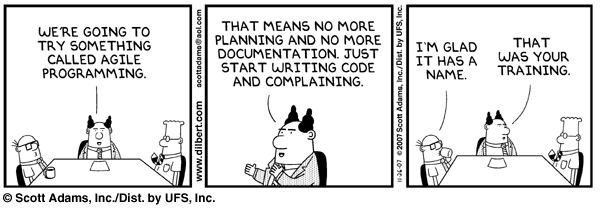
Finding a Balance: Analysis Paralysis vs. Busyness
Ive been fortunate (or perhaps unfortunate enough depending upon how you look at it) to work in a number of work environments that span the entire spectrum between planned and pensive vs. bootstrappy and mobile.
Growing up, I think adolescence conditions young people to embrace a culture of rapid progress and achievement orientation. Being an ambitious young man I was no different. I practiced piano with wild abandon. I didn’t want to play Mendelssohn and Scarlatti, which everyone seemed to start with. I wanted to play Chopin and Liszt. In an effort to seek out my glory through pianistic endeavor I hacked by way carelessly through endless cadenzas and developed what was truly a horrific piano playing technique, albeit a really dedicated passion and work ethic.

College is a stark contrast for many young people who are jettisoned from a world of SAT’s and extra circular activities to a world of scientific method and deliberation on concepts that have been developed over the course of centuries. In my academic pursuits, I certainly embraced the change of pace. Many that I know from college and grad school found it so appealing that they never wanted to leave and dedicated their lives to academia. There is after all something very intoxicating and refreshing about taking your time to solve really difficult problems.
However, in my piano studies, I never truly embraced a more deliberate mode of practice. My [amazing, brilliant, awesome] undergrad piano teacher attempted to draw me into the simplicity of minimalism and sonority with composers like Bartok and Arvo Part, and I definetely connected with that approach, but still over time I was still drawn back to the most bombastic and difficult pieces I could get my hands on settling for my senior recital on the hardest piece by Maurice Ravel, perhaps the hardest piece in the entire piano solo repetoire. The problem, however, never went away. When I went to study piano at the Jacobs School at IU, I was presented with the same dilemma. It was 3 weeks before my piano teacher even allowed me to touch the keyboard, forcing me to do finger exercises away from the keyboard, and study kinesiology of piano playing. When I finally did get to play, what was it? You guessed it, Mendelssohn.
It wasn’t until I discovered rock climbing that I was forced to fully embrace what I call the Dionysian Mode of problem solving. In rock climbing, you can get quite far muscling your way through problems. I even got the point within a period of a couple months in which I was climbing quite difficult problems (V3, V4, 5.11). But then you find that you hit a wall, a plateau that you cannot surmount. Muscling and campusing your way through hard problems no longer works, your progress slows, and you inevitably end up hurting yourself.
Deliberation
I learned that the best progress in rock climbing is made very gradually over time, and that developing good technique was essential to making long term progress. It was a concept that I had fully embraced in my professional life, but up until that point had not embraced fully in my other passions like music and sports, even if I convinced myself that I had. I found over time that once I embraced a more deliberate (I hesitate to say it but “mindful”) approach to climbing, that I was not only making more progress over time, I was also falling in love with the “process” of rock climbing, and even falling in love with the process of learning how to rock climb and teach it to others. Suddenly, I found myself going back to the “weird” polytonal composers my undergrad piano teacher had recommended to me and seeing in them new dimensions that I hadn’t seen before.
The Dionysian (chaotic, leisurely, intuitive) vs the Appollyian (focused, ordered, productive) mode has been a hallmark for many creative fields such as writing, art and music, to the point where historians have noticed that many successful writers, musicians and artists were bipolar and thus predisposed to work in such a way. However, does it apply to business and specifically tech businesses?
Neuroscience has been showing that the brain in fact works in two fundamental nodes, the “focused” mode, which corresponds to the Appolyian mode I mentioned above, and the “diffuse” mode:

These ideas as well as the above diagram are borrowed from a Coursera course from UCSD about learning which I highly recommend. In the focused mode trains of thought are tightly coupled with one another, whereas in the diffuse mode they are more loose and move more wildly. An example of this is free writing first popularized Dorothea Brande in which writers would sit down and write anything that first comes to mind. This could be viewed as an exaggeration or even exercise of the diffuse mode.
Diffuse Thinking in Tech
What does this mean for tech? It means that if the focused and diffuse mode is a fundamental character of how our minds work then it applies not just to creative endeavors but to everything that we potentially do, technology and business included.
As an example, take company cultures where a really strict agile methodology is embraced. In it there is a tendency to extrapolate the need for “productivity” and “progress” to turn everything into a permanent mode of “focused” thinking. The sprints become the constant focal point and the team is lead endlessly from one sprint to the next like a child wandering between fireflies in the darkness. Over time, overly opinionated cultures develop, processes set themselves in stone and employees become comfortable repeating routine tasks, and stop wondering if there is a better way. The effect of this on the spirit of employees and the health of a company is devastating, employees leave and cultures stagnate.

However, not only is it stifling for a company, but this mode of “iterative” working could result in catastrophic results for a companies technology strategy. In the same way that muscle your way through climbing problems will only get you so far, tech companies can eventually hit a plateau, a wall that cannot be surmounted by any amount of iteration, an exponential explosion of complexity that can consume entire organizations. Organizations might even find that many of the iterations that they embraced might not have been necessary. In college I became very interested in Daoism and a potential connection between its statements about generalization and the abstraction of mathematics. Lao-Tzu the author of the Dao De Jing, the seminal work of Daosim had once said the following:

In all of the organizations that I worked that embraced a solely focused mode of thinking without taking time to deliberate or ponder their path, I noticed a pattern. If the company had just waited a few more months, validated a few more clients, so many times they would have found that the problem they were so concerned with would have went away solely on its own.
This purely “iterative” mode of product development I call the “continuous evolutionary paradigm” of programming. Very gradual iterative changes result in a long term drift towards a particular goal. However, one evolutionary paradigm that this doesn’t take into account is the concept of Punctuated Equilibrium which says that in evolutionary history there are certain bottlenecks or periods of rapid progression that result from periods of distress on a population.
Nature’s Refactoring
A contrasting paradigm called “punctuated evolutionary programing” then might represent the need to periodically embrace diffuse modes of thinking. This is not a new concept, and essentially amounts to “stepping back and re-evaluating what has been done so far”. In an evolutionary sense, this equates to causing unnecessary distress by embarking upon what might be viewed (by business operations) as the unnecessary work of re-evaluating and change existing paradigms to strengthen the company for anticipated future periods of distress.
But this doesn’t just apply to the planning of features and projects but also to how programmers work on projects. If a developer feels a constant drive for productivity above and beyond what is reasonable, they will never stop to embrace a diffuse mode of thinking and possibly never conceive of an out of the box concept which may save companies tons of time and money. For this reason companies like Google have embraced the idea of “Free Fridays” where employees can work on any project that they like as long as it is in some way tangentially related to the companies core business.
Another example of the need to embrace the diffuse mode in tech companies can simply be seen through the need to collect more data before making big decisions. This is why the measurement driven product development mentality makes so much sense. It gives time for an idea to develop to a certain extent, before being developed further. What this gives rise to is more or less the lean methodology of operating tech companies.
So what about the other end of the spectrum? What about companies that fall victim to Analysis Paralysis or Planning hell? While the nature of business makes these occurrences much less frequent I have encountered those types of cultures as well. Usually a hesitation between the planning and the execution of a project can serve as a “smell” that the project plan has some ill conceived notion. Perhaps its not really technically feasible, but someone involved in the planning has been caught up in the grandiosity of the ideas. Perhaps its that there isn’t actually a user need for a particular project, so no one feels motivated to work on it or make it a priority. Time is the best winnowing fork for plans that have been yet to be acted upon, and over time a different plan will present itself.

The conclusion that you inevitably draw is not that the Focused/Appolyian mode is at odds with the Diffuse/Dionysian mode, but that they are inextricably linked to one another and both essential when thinking creatively about technology and business problems.
In the end a good plan leaps from the page and puts itself into action, and an action worth pursuing wont go away if you take some time to think it through and collect more data. In other words, in an ideal culture Apollo and Dionysus are not racing one another, but handing the baton back and forth endlessly to one another while moving towards the goal.
Kyle Prifogle
Twitter Facebook Google+
